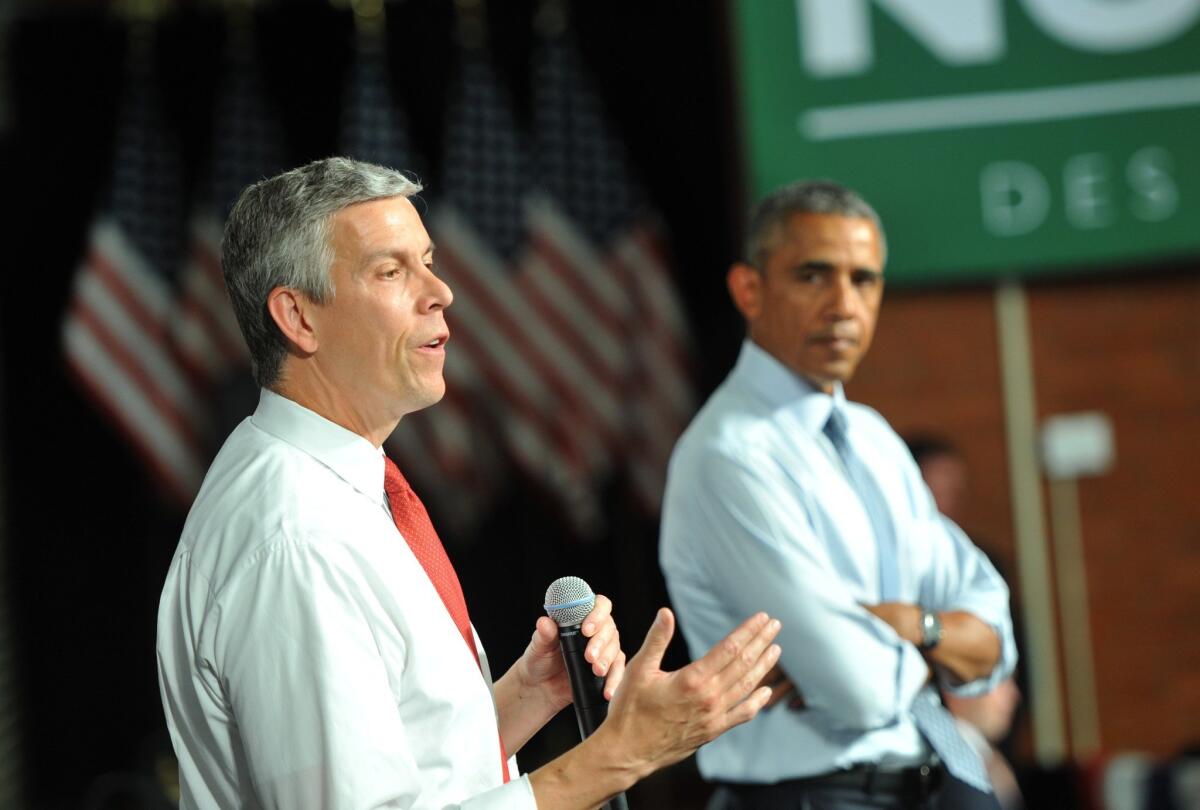Unlike his predecessors, Arne Duncan tackled more higher ed issues, like sex assault

U.S. Secretary of Education Arne Duncan, left, and President Obama attend a town hall meeting in Iowa last month about student loans. Duncan said Friday that he will step down from his post in December.
- Share via
U.S. Secretary of Education Arne Duncan, who announced Friday that he would leave the Obama administration in December, advocated for changes on college campuses in areas as divergent as tuition grants and sexual assault.
In the realm of higher education, Duncan pushed to expand federal grants to low-income students, reduce the role of commercial banks in student lending, crack down on for-profit schools that had low graduation rates and make the overall performance records of colleges and universities more transparent.
His department also attracted much attention by launching investigations into how campuses handled student allegations of sexual assaults and harassment, aiming to change attitudes toward social life and drinking among young people.
Many of his efforts met furious opposition from some segments of the education and lending establishment. But his supporters stress that colleges now feel much more pressure to be accountable to a wider public on a host of issues, such as how long it takes students to graduate, and to feel at least partly responsible for keeping students safe from the sexual predators among them.
University of California President Janet Napolitano, who served alongside Duncan in the Obama cabinet as Secretary of Homeland Security until 2013, praised Duncan on Friday as “a tremendous advocate for students at all educational levels.”
In a statement, she said Duncan worked hard to “increase investments in student financial aid, break down barriers to educational access and attainment, and ensure stronger accountability for the federal financial investment in education.”
Duncan “has been a valuable partner in advancing excellence in education across the nation and in addressing the many challenges and opportunities facing our institutions of higher education, particularly public universities,” Napolitano said.
One of Duncan’s signature campaigns was to stop the flow of billions of dollars in federal grants, loans and GI Bill benefits to for-profit schools that graduated few students and did not properly train them to get jobs. So-called gainful employment rules from his department will cut off access to loan money to schools that can’t show that graduates earn enough to repay the loans.
Duncan helped shift the focus of the department from aiding schools and banks to that of “students and borrowers,” according to Lauren Asher, president of the Institute for College Access and Success, an Oakland-based group that works to reduce student debt. While her organization has disagreed with some details of Duncan’s policies, overall, she said he “led important steps in college accountability and transparency.”
Among those changes, she noted, were efforts to simplify the Free Application for Federal Student Aid, or FAFSA, the complicated form that families must fill out to apply for financial aid, and moving federal loan administration away from banks and back to the government.
In addition, with funding from Congress, Duncan helped raise the numbers and sizes of Pell grants, the basic federal aid to low-income students; the maximum Pell grant is now $5,775 a year. Unfortunately, the cuts in state support for public colleges have led to such large tuition hikes across the country that the Pell grants have not kept up.
The Times’ new education initiative to inform parents, educators and students across California >>
In recent years, the federal government has launched an unprecedented campaign against campus sexual assault, with more investigations, fines and guidelines than ever before. Initially, many college officials fretted that they were untrained to conduct investigations, while some local police expressed concerns that multiple parties investigating the same cases could taint witnesses or compromise evidence.
But more recently, colleges have scrambled to establish anti-harassment education for students, set up offices to handle complaints, and provide a much more sympathetic environment for alleged victims.
Terry W. Hartle, the American Council on Education’s senior vice president for government and public affairs, said Duncan, like most of his predecessors, mostly focused on K-12 education, but he differed from them in significantly expanding the role of the federal government in higher education. “He’s a tall man and he will leave a long shadow,” Hartle said.
While colleges and universities agreed with some of Duncan’s policies, such as expanding financial aid, many felt that some of his department’s regulations were “clumsy” and tried to impose “one-sized” solutions on a very wide variety of schools, Hartle said. For example, he said, the gainful employment rules aimed at for-profit schools also cover public community colleges.
One of Duncan’s most visible failures was an effort to develop a ratings system under which colleges were to be assigned some kind of evaluation or even grade based on such criteria as graduation rates, the number of students defaulting on loans and the income of graduates.
The idea proved to be hugely difficult and controversial, with much of the higher education establishment opposing it, saying they feared being unfairly judged. Recently, Duncan retreated and dropped the idea, instead choosing to expand a federal website that offers consumers a lot of useful information on those issues and allows them to compare and make their own decisions.
Twitter: @larrygordonlat
More to Read
Sign up for Essential California
The most important California stories and recommendations in your inbox every morning.
You may occasionally receive promotional content from the Los Angeles Times.











